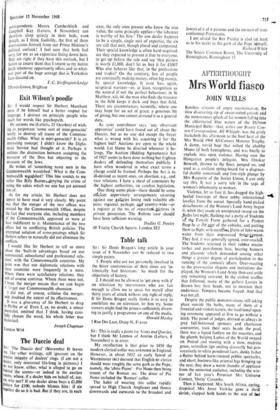The Duccio deal Sir: 'The Duccio deal' (November 8) leaves
me, like other writings, still ignorant on the Precise iniquity of dealers' rings. (I am not a dealer, only interested life-long in pictures.) I do not know, either, what is alleged to go on behind the scenes—or indeed in the auction rooms, where, if a dealer bids on behalf of, say, au, why not? If one dealer alone buys a £1,000 Picture for f100, nobody blames him : if six together do so it is bad. But if they are, in each case, the only ones present who know the true value, the same principle applies—`the labourer is worthy of his hire.' The one dealer happens to be a simple, single unit of expertise, the six are still that unit, though plural and compound. Their special knowledge is often hard-acquired, are they expected to present it free to everyone, to get up before the sale and say 'that picture is worth £1,000, don't let us buy it for £100? Who else behaves like that, in the professions and trades? On the contrary, lots of people are continually making money, often big money, by special knowledge. It even has, again, scriptural warrant—or, at least, recognition as the natural if not the perfect behaviour; in St Matthew, xiii, 44, the man who finds the treasure in the field keeps it dark and buys that field. There are circumstances, naturally, where one may hope for an act of grace, a generous bit of giving, but one cannot demand it as a general duty.
As your contributor says, 'any observant apprentice' could have found out all about the Duccio; but as no one did except the buyer what is wrong with his acquiring it for the highest bid? Auctions are open to the whole world. Let blame be directed wherever it be- longs. The Auotion (Bidding Agreements) Act of 1927 seems to have done nothing but frighten dealers off defending themselves publicly. I have often wondered in what exact terms a charge could be framed. Perhaps the Act is as ill-devised as recent ones, on abortion, e.g., and race relations. I have a sheaf of comments by the highest authorities, on careless legislation.
One thing seems plain—there should be some efficient supervisory arrangements ensuring against our galleries losing such valuable ob-
jects; regional, perhaps, and -country-wide—or a register at the NG of importanC4ctures in private possession. The Rubens case should have been sufficient warning.






































 Previous page
Previous page